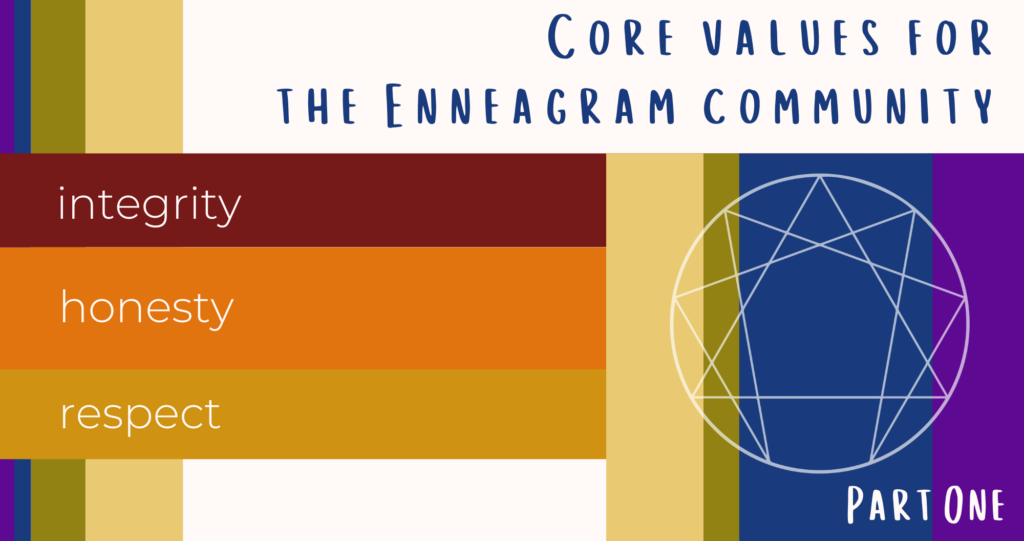In recent years, the International Enneagram Association (IEA) has formulated ethical guidelines for Enneagram teachers. Although most of their guidelines refer to Enneagram teacher-student situations, several of them seem, at least it appears to me, to also apply to how Enneagram teachers interact with one another and how Enneagram schools treat one another as well as their staff and faculty.
This first blog focuses on the IEA ethical standard of honesty, integrity and respect: IEA Community Standard: “We will be honest and act with integrity and respect in our dealings with each other.” What does this really mean?
First, consider the term honesty and its close cousin, truthfulness. Honesty means not telling lies, while truthfulness refers to making known the full truth. Theoretically and practically, a person can be honest as in telling no lies, yet unknowingly or worse, knowingly, not share certain information and thus be untruthful. In this sense, a person can be honest, yet deceptive.
However, as we know, we can only be honest and truthful when sharing with others to the extent that we are honest and truthful with ourselves. Our Enneagram types can lead us to “lie,” but in nine different ways. For example, when we are distressed, our defense mechanisms often get highly activated. Ones may engage in reaction formation and do and say the opposite of what they really feel, or Twos can go into major repression so they don’t even know what they are feeling in an honest way.
Our types can also trick us into not being honest or truthful when we do something or feel something that contradicts our ego-ideal. For example, when Threes feel their ego ideal of being a successful, competent person is challenged by their own behavior, they may go into increased activity as a way to ignore the discrepancy between their ideal and actual self. Similarly, Sevens may seek more stimulation and excitement to move away from the whole truth.
And then there’s the issue for everyone of being really clear on our true motivations. In other words, why are we really doing what we are doing? To behave toward others out of integrity and respect, we need to be clear and truthful regarding our own motives. How many times do we hear someone explain, “My intentions were good!”? Please think about this: What if our intentions were truly good but the effect was really bad? Also think about this: What if saying our intentions were good is just a story we tell ourselves because our real intentions were not good? Perhaps we don’t want to admit to our real intentions and may be even deceiving ourselves?
Integrity and respect for others are complex ideas, yet important ones. Integrity technically refers to congruence or consistency between our values and behaviors. And technically, a person can be in integrity but with a value system that harms others. Then there are some rules for respectful behavior to consider:
Golden Rule: “Treat others the way you want to be treated.”
Platinum Rule: “Treat others the way they want to be treated.”
Titanium Rule: “Treat others the way they need to be treated.”
All of these rules are good to follow. The Golden Rule is a good starting place: Would I want this done to me? If the answer is no, think about what you are doing again. Next, the Platinum Rule is really helpful. Not everybody wants to be treated the same way I do. If I don’t know if the other person wants this too, find out by doing some research and even asking them. Finally, the Titanium Rule implies others may know what they want, but what they really need might be something else. Explore this.
Situation: There’s a way of teaching the Enneagram system or types that does not match or align with the way you teach it.
What does treating other teachers with integrity and respect look like…
When, and only when, one of your participants asks you a direct question about the approach with which you disagree, you say something like this: “I don’t use this (or agree with it)” and you can name or not name your reasons in a non-judgmental way. You can also add that different Enneagram teachers can teach things differently.
What does treating other teachers with integrity and respect does NOT look like…
The first issue is bringing up another teacher’s differing approach to something when no one asks you about it, and you choose to bring it up on your own. Why do that? Don’t; it is disrespectful. The second issue is the judgment associated in how you talk about the differing approach. Don’t criticize the other person’s work. Why do that? I really don’t know anyone who would want that done to them.
Ginger Lapid-Bogda PhD, author of nine Enneagram books, is a speaker, consultant, trainer, and coach. She provides certification programs and training tools for business professionals around the world who want to bring the Enneagram into organizations with high-impact business applications. TheEnneagramInBusiness.com | ginger@theenneagraminbusiness.com


Comments are closed.